Young Bus Professionals impress
A host of speakers encourage tomorrow’s leaders in the making
Organisers of the Young Bus Professionals conference in Cambridge recently were wowed by delegates’ efforts in a video-making workshop activity.
The young professionals were given the task of splitting into groups and recording a video promoting bus travel. Rounding out the event by showcasing the handful of videos produced, patrons of the professional network commented on the ingenuity, initiative and sheer creativity displayed by the delegates, surprised at the high quality of the outcome of their work.
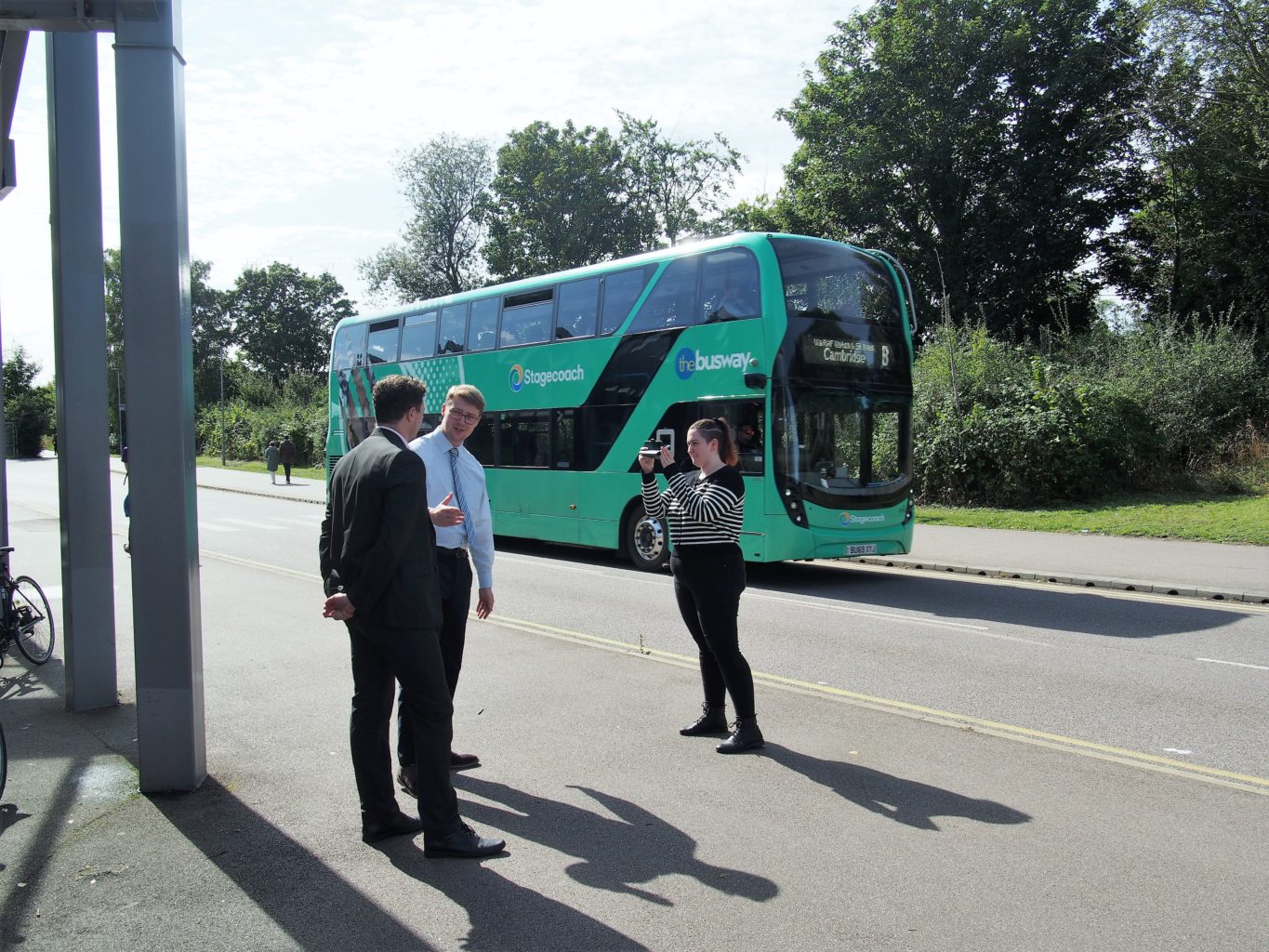
Delegates at the Young Bus Professionals take part in a video making exercise
Cambridge played host to the Young Bus Professionals network’s latest conference. The two-day event at the Novotel near Cambridge North train station began with a trip along the Cambridge Guided Busway, followed by a visit to Stagecoach East’s Cowley Road depot. A dinner was followed by an inspiring speech from Bill Hiron, Stephensons of Essex MD and ALBUM Chair.
Private and public sectors working together
The next day’s conference saw a welcome by industry veteran and former B&CB columnist, Roger French, followed by Adam Leishman, Founder, Owner and Executive Chairman of Ascendal Group describing the story of his organisation. Adam described his business’ rise, charting its origins in Australia where his grandfather set up a bus operation. His father took over and revised the way the company ran, leading to a positive turnaround in the operation’s fortunes.
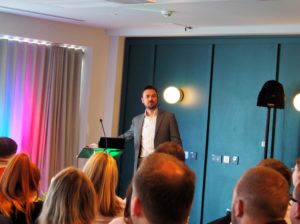
Adam Leishman introduces Ascendal Group to the gathering
Unfortunately, the business folded in the early ’90s after a coach accident that saw 13 people die. However, Adam’s father and his business partner returned to operating and in 1996 they won their first franchised contract in Perth for 40 buses. Adam said: “We find where the best outcomes are is when the private and public sectors work together.”
After improving this operation’s KPIs, the business, called Transit Systems Group, won more franchised bus network tenders in Adelaide. In 2013, it took on its first contract in Sydney. That same year, it won work in London, operating as Tower Transit and taking on First London depots. Adam Leishman came onboard with the business and relocated to London to run this new overseas venture. “This was an amazing experience for me,” he said, although admitted he did have imposter syndrome when he took on the CEO role of this operation.
Tower Transit then moved into the Singapore market in 2015, becoming the first international operator to enter the island country’s bus network. “It was one of the most amazing periods of my life,” said Adam, who helped set it up. “The culture is amazing.”
he remembers appearing on the front cover of a newspaper when the deal was struck; it was big news in Singapore. Public transport is of mass interest in Singapore, with Adam noting that on these shores we only hear of it when it is not working.
Adam left the business and formed Ascendal Group in 2018, taking with him Cambridgeshire-based Go Whippet. In the middle of the pandemic, the business took on the Citybus operations in Hong Kong. It was a very experience as it was when Adam took on the London operation, he reports, turning the business’ fortunes around. He said: “Hong Kong is probably one of the only cities without government subsidy for buses. We actually subsidised the elderly persons’ ticket ourselves.”
It moves 1m people a day in the city, with nine out of ten trips taking place in the area using public transport, with buses making up 50% of those journeys.
On franchising, Adam said: “It’s an amazing tihng if it’s done well. The biggest concern is it becomes a race to the bottom. It can be dangerous if local authorities accept low cost bids.”
Adam got the audience to list off issues associated with city life, including: pollution, overcrowding, road congestion, etc. He said all of these problems can be alleviated to at least some degree with buses, labelling them ‘underrated superheroes’.
“Rail is very limited, but buses are far more flexible,” he said. “Cities should be designed for people, not vehicles. We are the solution.”
Jonathan Ziebart, MD UK at Ascendal Group, said the 15 years he has been working in the transport industry have been amazing. After working for First’s rail division over a summer holiday at university, Jonathan joined the business in the contract bidding department. After an exciting time of intense bidding in the UK, he helped the Group focus on its international rail business. It saw him work on gaining business in the US.
It was during is time in the US that he started in the bus industry, with the take over of Panama’s bus network. He also had a part to play in the operator’s take over of bus contracts in India.
After First clamped down on international growth, he heard of some colleagues who were involved in the disposal of First’s bus operations in London to Adam. He joined Tower Transit and helped establish the Singaporean bus division.
The next challenge was Chile, where he developed the company’s business by winning contracts.
He said: “I then had a huge opportunity to work with Ascendal.”
During Covid, he received a phone call asking him to work on the recently acquired Hong Kong business. “It was an amazing experience,” Jonathan remembered. “I was heavily involved in the Hong Kong hydrogen strategy.”
He is now the MD of Ascendal UK, including the Whippet operations. He said: “I’ve been involved with larger operators in the past, but small operators like this can be really complicated; it’s been one of the hardest challenges.
“Also, we have grown with FlixBus. We recently launched an electric coach service between Cambridge and London.”
Stagecoach CEO’s debut
CEO of Stagecoach, Claire Miles, made her first industry conference appearance since joining the company in October 2023.
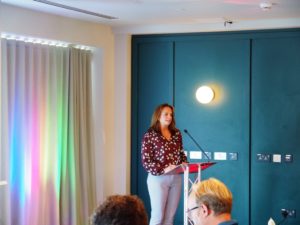
Claire Miles makes her industry conference appearance
Taking to the podium at the Young Bus Professionals conference in Cambridge, she began by saying that 12 months ago before joining Stagecoach she knew very little, but is now becoming a ‘bus nerd’. She said she hopes this role will become the longest held position she has.
Claire lives in London with her two teenage sons and two spaniels. As well as her job at Stagecoach, she is also on the board of waste management company Biffa.
She said: “I am unbelievably happy to be here. I’m very happy in my role and proud to work at Stagecoach.”
Highlighting that Stagecoach is perhaps one of the most successful start-ups ever, rising dramatically from its foundation by Bryan Souter and Ann Gloag in 1980, Claire said she joined at a point where the company was ‘going back to its roots’.
Previous roles include being head of credit card company Marbles, before taking on a leading role at Centrica, which owns British Gas. The latter position saw her run the HomeCare business, giving her experience in having a fleet out on the road 24/7. She also worked for Hive and then was CEO of Yell. Throughout these roles, she says one thing that she is passionate about is the customer experience: “Do they like it enough to come back?”
She said: “Over the years, I’ve become obsessed with customer insight and sentiment and customer experience. As an industry, we really need to become better at understanding their needs. I’m surprised how little the industry knows about people on the bus. We carry millions and we don’t know who they are. We have an enormous opportunity as vehicles and technology evolves to do this.”
Quoting the phrase ‘eat your own dog food’, she said: “Would I buy this product? It’s a really good phrase.”
She continued: “I also need to be in a business where there is change and opportunity for transformation.”
She notes that is certainly the case in the bus sector currently: “There are massive opportunities coming down the track. There’s a lot going on, but that’s really good for me; it’s exciting.”
Stress and safety
Nathan Burge, Health, Safety & Technical Manager, McGill’s Buses, told the gathering how he has forged a career through the workshop and into health and safety practices. Moving down from Scotland to London when younger, he began his career at Go-Ahead London in various workshop and engineering roles. He became Workshop Manager at Stagecoach in North Lanarkshire in 2019, before taking on his current role at McGill’s.
Throughout his career he has learnt that the bus sector is a ‘people business’. “It’s really important to remember that,” he said. Work related injuries are not all happening in the garage, he stresses, and that health and safety must be something considered right across the business.
Citing figures on causes behind absence through sickness at work, Nathan highlights that stress, depression and anxiety are behind 49% of absences. He said: “We don’t often stop and think: ‘Is this person OK?’ We have to think what we can do to reduce stress. Health and safety culture is a big thing I think we could improve. And I certainly think we can. It’s about the full team buying into it.”
He urges: “We can always do things safely. No job is so important, no task is so urgent, that we don’t have time to do it safely.”
Ticketer – a connected network
Leeds-born Kelly Hanna, Chief Executive Officer at Ticketer, gave an introduction to her career. After finding out studying law was not for her, she abandoned her studies and enlisted in the army. After serving in Bosnia, she found this was not her cup of tea either.
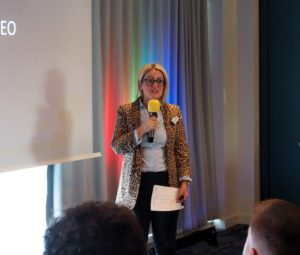
Kelly Hanna gives the audience some advice on succeeding in their careers
Kelly then worked at her local authority, starting out in the post department, making her way up the ranks. She then moved to human resources firm, NGA, becoming Vice President Transformation and Delivery Support, before taking on the role of Vice President Eu Operations, Vendor Payroll & Global Support Services at Alight Solutions.
She provided some business advice to John Clarfelt, the founder of Ticketer, which saw John go on to ask her to join the company, to which she replied: “Hell, yeah!”
Kelly liked the enthusiastic nature of the business and was amazed at the software behind the technology.
She gave some advice for success in work: “Don’t just work hard, work your backside off. Be that person that gets stuff done. Be the go-to; it pays off.
“What you also need is a mentor, someone who sees something in you. They enabled me to make things happen and gave me the confidence to make things happen.”
She continued: “If you have a manager that’s not great, they will not make you successful. Go find a good one.”
Back on the topic of Ticketer, Kelly said the business is involved with TfGM’s franchised Bee Network and it is keen to work with other franchises as they emerge.
She gave the figure of 7.2bn tickets issued by Ticketer since its inception, all of which are still logged on the company’s system.
She highlights it is the software behind Ticketer that makes it special, rather than the hardware. The goal with the system is to create a connected bus, integrating ticketing and data with various functions on a vehicle for an ecosystem across a fleet or wider network.
Repower
Oli Knights, Head of Technical Sales, Equipmake, introduced his company to the gathering. As well as working in power electronics, the Snetterton-based firm also provides bus and coach repowers, converting vehicles from diesel to electric power. Founded by Ian Foley, the
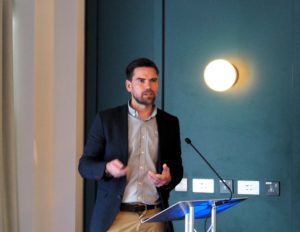
Oli Knights introduces Equipmake’s repower solution
business spotted a gap in the market to develop an electric powertrain, which is the core of its repower offering.
Every repower project presented involves a feasibility study, which Oli says involves quite a detailed analysis to ensure the solution matches the life in service it is going to fulfil. The conversion is carried out in-house at Equipmake, fitting its system to the available space. Once engineered, the repowered vehicle is then shipped off to MIRA for approval before being put back into service.
Oli said: “If it’s a vehicle we have done before, then it can be three to four weeks from receiving the vehicle to going back to the customer.”
On what part repower could play in the market, Oli said: “For the big groups to fulfil zero-emission requirements, is it all going to be done by buying new electric vehicles? Probably not. Repowers are available now.”
An advantage of a repower is it offers an electric bus or coach at a half to a third of the cost of a BEV equivalent, according to Oli: “It extends the life of a vehicle by seven to ten years. It directly replaces a legacy vehicle and it just adds another layer of familiarity.”